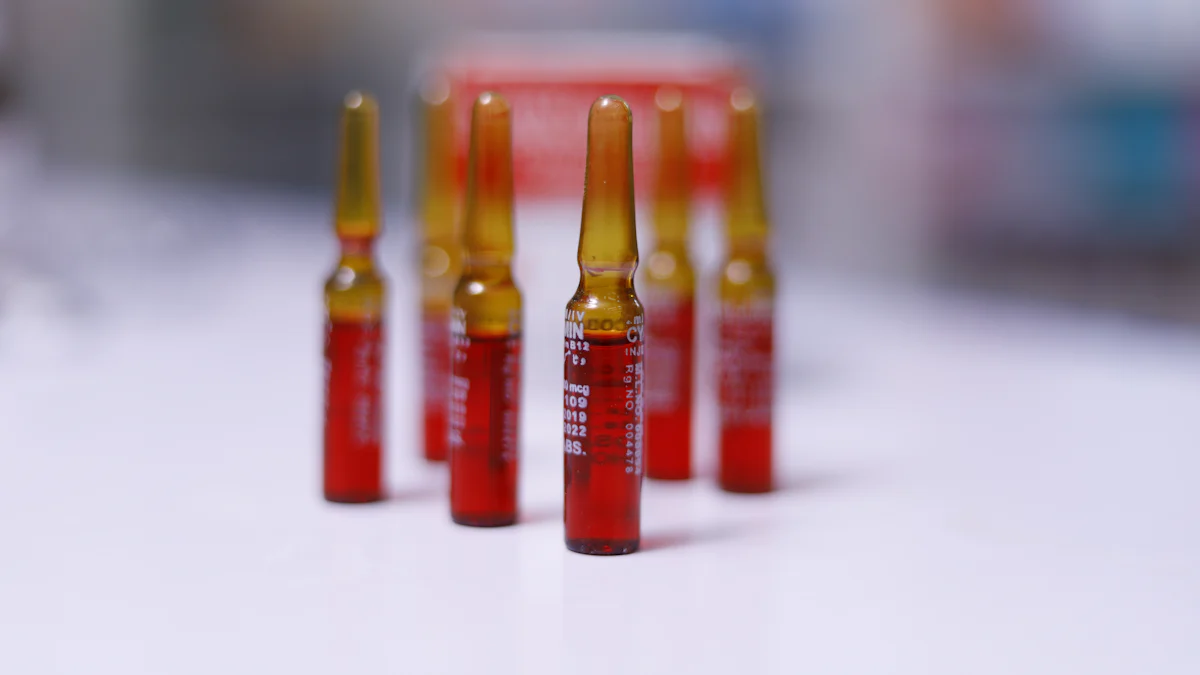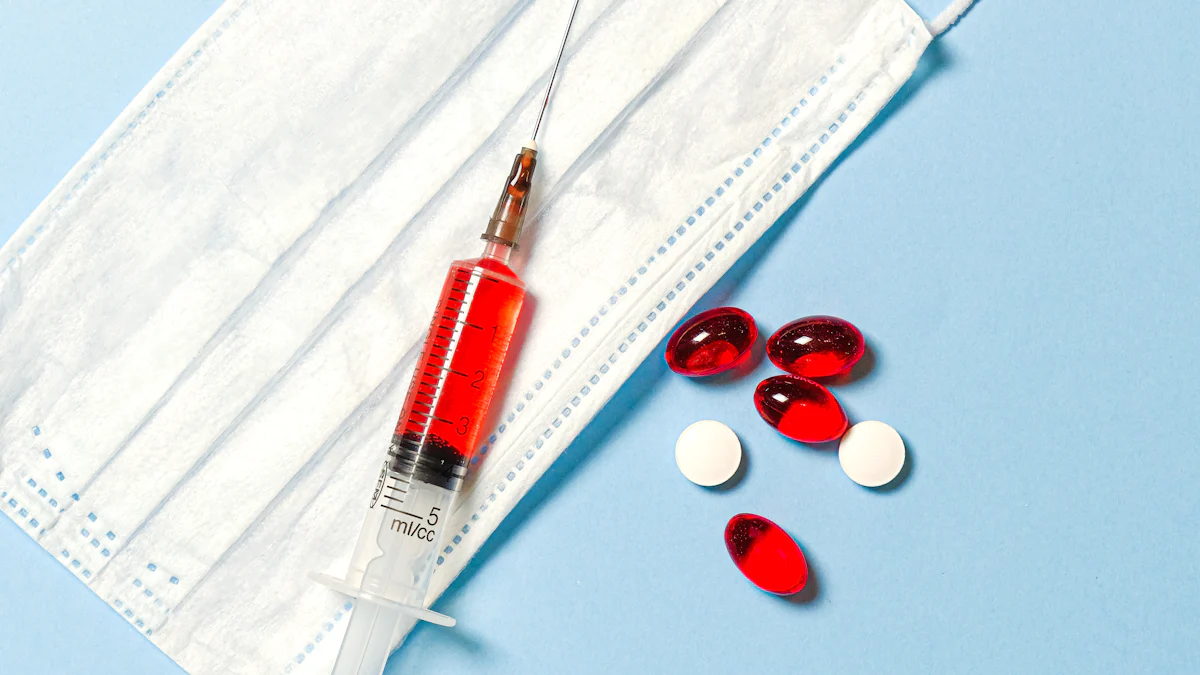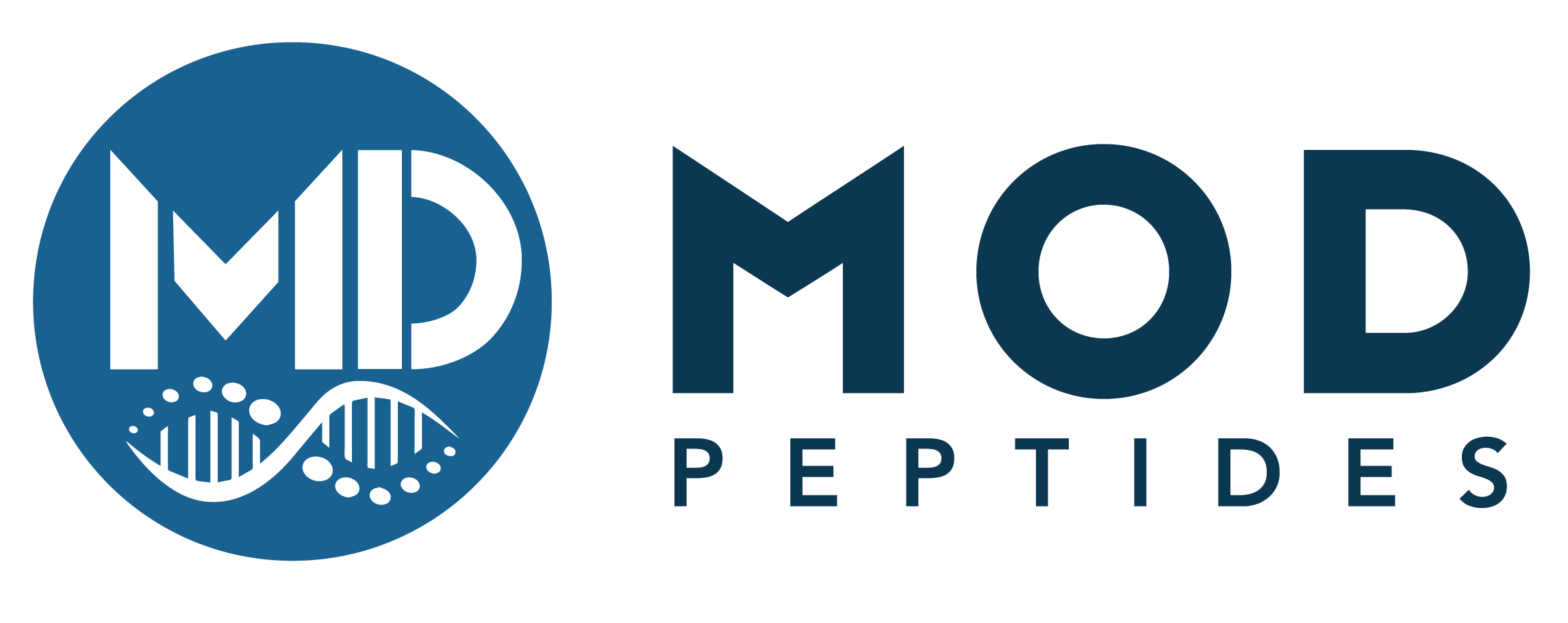Understanding the Side Effects of Tirzepatide Plus B12
Vitamin B12, also known as cobalamin, plays a crucial role in energy production and metabolism. This essential nutrient supports red blood cell formation and nervous system health.
Combining compounded tirzepatide with B12 creates a powerful synergy. This combination enhances weight loss and mitigates potential side effects like nausea.
What is Tirzepatide?
Mechanism of Action
How Tirzepatide Works in the Body
Tirzepatide activates both GIP (glucose-dependent insulinotropic polypeptide) and GLP-1 (glucagon-like peptide-1) hormone receptors. These receptors play crucial roles in regulating blood sugar levels and appetite. GLP-1 helps control appetite and calorie intake. GIP contributes to regulating food intake. The dual action on these receptors makes tirzepatide effective in managing weight and blood sugar levels.
Benefits of Tirzepatide
Tirzepatide offers several benefits:
-
Weight Loss: Clinical trials have shown significant weight reduction. Participants experienced up to 20% reduction in body weight over 72 weeks.
-
Blood Sugar Control: Tirzepatide enhances insulin secretion and inhibits glucagon release. This leads to better blood sugar management.
-
Cardiovascular Health: Improved blood sugar control and weight loss reduce the risk of heart disease, hypertension, and stroke.
Approved Uses
Treatment of Type 2 Diabetes
Tirzepatide is approved for the treatment of type 2 diabetes. The medication helps manage blood sugar levels effectively. Improved glycaemic control reduces the risk of diabetes-related complications.
Other Potential Uses
Researchers are exploring other potential uses for tirzepatide. These include treatments for obesity and metabolic disorders. Ongoing studies aim to expand the therapeutic applications of this medication.
The Role of Vitamin B12
Importance of B12 in the Body
Functions of B12
Vitamin B12, also known as cobalamin, supports several vital functions in the body:
-
Energy Production: B12 plays a key role in converting food into energy. This process helps maintain energy levels throughout the day.
-
Red Blood Cell Formation: B12 aids in the production of healthy red blood cells. Proper red blood cell formation prevents anaemia and ensures efficient oxygen transport.
-
Nervous System Health: B12 supports the maintenance of a healthy nervous system. This vitamin promotes cognitive function and reduces the risk of neurological disorders.
"Vitamin B12 plays a key role in many aspects of health, including supporting eyes, bones, skin, red blood cell production, vision health, memory, bone health, mood improvement, and cognitive decline."
Sources of B12
The body cannot produce Vitamin B12, so it must be obtained from dietary sources or supplements. Common sources include:
-
Animal Products: Meat, fish, poultry, eggs, and dairy products are rich in B12.
-
Fortified Foods: Some cereals, plant-based milk, and nutritional yeast are fortified with B12.
-
Supplements: B12 supplements are available in various forms, including tablets, capsules, and injections.
B12 Deficiency
Symptoms of Deficiency
A deficiency in Vitamin B12 can lead to several health issues. Common symptoms include:
-
Fatigue: Low energy levels and persistent tiredness.
-
Anaemia: Reduced red blood cell count leading to weakness and pale skin.
-
Neurological Issues: Numbness, tingling in the hands and feet, and difficulty walking.
-
Cognitive Impairment: Memory loss, confusion, and difficulty concentrating.
"Vitamin B12 deficiency can cause significant health problems, including fatigue, anaemia, neurological issues, and cognitive impairment."
Treatment Options
Addressing a B12 deficiency involves increasing intake through diet or supplements. Treatment options include:
-
Dietary Changes: Incorporating more B12-rich foods into the diet.
-
Oral Supplements: Taking B12 tablets or capsules as recommended by a healthcare provider.
-
Injections: Receiving B12 injections for faster absorption, especially in severe cases or when oral supplements are ineffective.
"Vitamin B12 supplementation can help mitigate some potential side effects of Tirzepatide, such as nausea."
Ensuring adequate B12 intake supports overall health and enhances the effectiveness of compounded tirzepatide therapy.
Combining Tirzepatide and B12

Rationale Behind the Combination
Synergistic Effects
Combining compounded tirzepatide with B12 enhances weight loss and improves treatment tolerability. Tirzepatide activates GIP and GLP-1 receptors, which regulate blood sugar levels and appetite. Vitamin B12 supports energy production and metabolism. This combination addresses multiple aspects of weight management.
Tirzepatide alone has shown significant weight reduction. Clinical trials reported an average weight loss of 22.5% over 72 weeks. Adding Vitamin B12 boosts metabolic processes and energy levels. This synergy leads to more effective and sustainable weight loss.
Clinical Studies and Findings
Clinical studies have explored the effects of combining compounded tirzepatide with B12. These studies demonstrated enhanced weight loss results. Participants experienced improved treatment tolerability. No significant interactions between Tirzepatide and Vitamin B12 were found. However, healthcare providers advise caution when starting this combination therapy.
Administration and Dosage
Recommended Dosages
Healthcare providers determine the appropriate dosage for each patient. The recommended dosage of Tirzepatide varies based on individual needs. Typically, patients start with a lower dose and gradually increase it. Vitamin B12 dosage depends on the patient's deficiency level and overall health.
Methods of Administration
Patients receive compounded tirzepatide with B12 through injections. Healthcare providers administer these injections subcutaneously. Patients can self-administer the injections after proper training. Regular follow-ups ensure the effectiveness and safety of the treatment.
Potential Side Effects of Compounded Tirzepatide with B12

Common Side Effects of Compounded Tirzepatide with B12
Gastrointestinal Issues
Compounded tirzepatide with B12 may cause gastrointestinal issues. Patients often report nausea, vomiting, and diarrhoea. Some individuals experience constipation and upset stomach. These symptoms usually appear at the beginning of the treatment. The body often adjusts over time, reducing the severity of these side effects.
Injection Site Reactions
Patients may experience reactions at the injection site. Common reactions include swelling, redness, and itching. These reactions are generally mild and temporary. Proper injection techniques can minimise discomfort. Healthcare providers offer guidance on self-administration to reduce these reactions.
Serious Side Effects of Compounded Tirzepatide with B12
Hypoglycemia
Compounded tirzepatide with B12 can lead to hypoglycemia. This condition involves low blood sugar levels. Symptoms include dizziness, sweating, and confusion. Severe cases may result in loss of consciousness. Monitoring blood sugar levels regularly helps manage this risk. Healthcare providers adjust dosages to prevent hypoglycemia.
Allergic Reactions
Allergic reactions to compounded tirzepatide with B12 are rare but possible. Symptoms include rash, itching, and swelling. Severe allergic reactions involve difficulty breathing and swallowing. Immediate medical attention is necessary for severe reactions. Patients should inform healthcare providers of any known allergies before starting treatment.
Long-term Considerations
Monitoring and Follow-up
Long-term use of compounded tirzepatide with B12 requires regular monitoring. Healthcare providers conduct routine check-ups to assess the treatment's effectiveness. Blood tests help track blood sugar levels and vitamin B12 status. Regular follow-ups ensure early detection of potential side effects.
Managing Side Effects
Managing side effects involves several strategies. Patients should maintain open communication with healthcare providers. Adjusting dosages can alleviate some side effects. Incorporating dietary changes may help manage gastrointestinal issues. Adequate hydration and a balanced diet support overall health. Vitamin B12 supplementation can mitigate nausea associated with tirzepatide.
Safety and Precautions
Who Should Avoid This Combination?
Contraindications
Certain individuals should avoid using compounded tirzepatide with B12. Those with a history of severe allergic reactions to either tirzepatide or Vitamin B12 should not use this combination. Individuals with a known hypersensitivity to any component of the medication should also refrain from its use.
Patients with a history of pancreatitis should exercise caution. Tirzepatide may increase the risk of pancreatitis. Healthcare providers will evaluate the risks before prescribing this treatment.
Special Populations (e.g., pregnant women, elderly)
Special populations require careful consideration. Pregnant women should avoid using compounded tirzepatide with B12 due to potential risks to the foetus. The safety of tirzepatide during pregnancy has not been established. Healthcare providers will recommend alternative treatments for pregnant patients.
Elderly patients may experience different side effects. Age-related changes in metabolism and organ function can affect how the body processes medications. Healthcare providers will adjust dosages accordingly and monitor elderly patients closely.
Interactions with Other Medications
Potential Drug Interactions
Compounded tirzepatide with B12 may interact with other medications. Patients taking insulin or other antidiabetic drugs should be cautious. Combining these medications can increase the risk of hypoglycemia. Regular blood sugar monitoring is essential.
Alcohol consumption can also lead to severe low blood sugar levels. Patients should limit alcohol intake while using this combination therapy. Certain medications for gastrointestinal conditions may affect the absorption of Vitamin B12. Healthcare providers will review all current medications to prevent interactions.
How to Mitigate Risks
Mitigating risks involves several strategies. Patients should inform healthcare providers of all medications and supplements they are taking. Regular blood tests will help monitor blood sugar levels and Vitamin B12 status.
Healthcare providers may adjust dosages based on individual needs. Patients should follow dietary recommendations to support overall health. Adequate hydration and a balanced diet can help manage potential side effects.
"Consulting a healthcare provider is crucial before starting any new treatment. Open communication ensures safe and effective use of compounded tirzepatide with B12."
Regular follow-ups with healthcare providers will ensure early detection of any adverse effects. Proper management and monitoring can enhance the safety and efficacy of the treatment.
-
Recap of the key points discussed
The blog explored the benefits and mechanisms of Tirzepatide and Vitamin B12. The combination enhances weight loss and improves blood sugar control. Clinical trials showed significant weight reduction and improved treatment tolerability.
-
Importance of consulting healthcare providers
Consulting healthcare providers ensures safe and effective use of compounded Tirzepatide with B12. Healthcare providers can tailor treatments to individual needs and monitor for potential side effects.
-
Final thoughts on the use of Tirzepatide plus B12
Combining Tirzepatide with Vitamin B12 heralds a new dawn in weight management. This innovative approach offers a holistic solution for those struggling with weight loss and diabetes.
-
Encouragement to stay informed and vigilant about side effects
Staying informed about potential side effects is crucial. Regular follow-ups and open communication with healthcare providers enhance the safety and efficacy of the treatment.

 USD
USD




